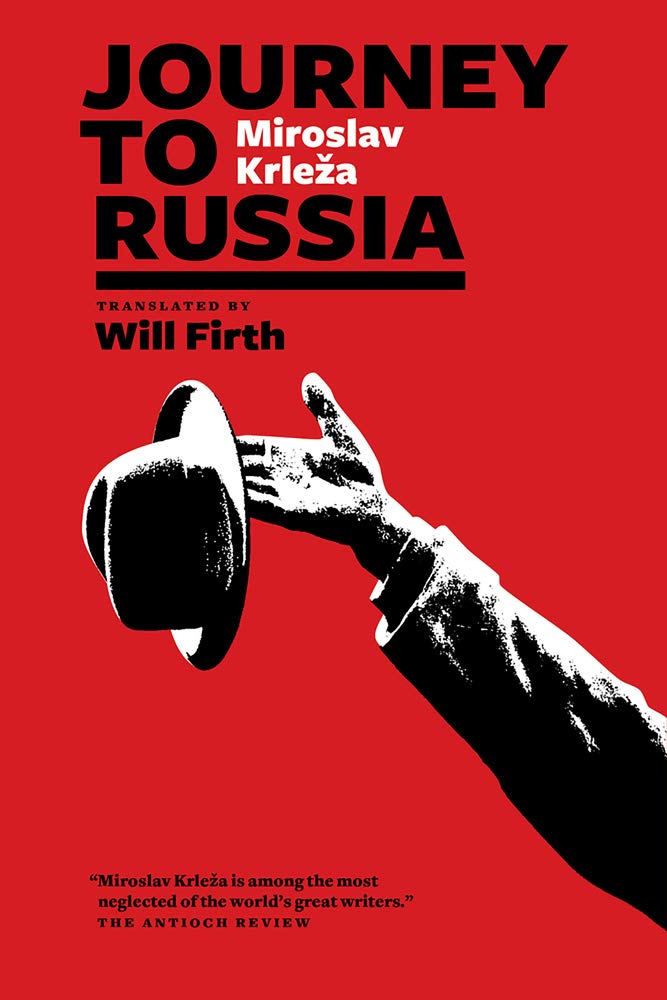If I had been a better planner, I would have made an effort to read a Croatian author or two before spending a week and a half in Zagreb. Instead, I hustled from one store to the other in search of English translations of Croatian. That’s one way to spend a vacation, I suppose!
But in the end I triumphed. One of the books I came away with was Miroslav Krleža‘s essay collection Journey to Russia, translated by Will Firth. I will fully admit that even though I liked it, I might not have given the book the full attention it deserved. For one, I read a goodly portion of this book under the influence of a not insubstantial amount of beer. For another, midway through I became gripped by the fantastic ambition to finish it and mail it to a book friend before my flight home. It’s exactly the kind of thing they would love and it would be less weight for me to schlep around! Everybody wins! The only problem with this brilliant plan was that I no longer had their address saved on my phone, which I didn’t realize until I got to the last chapter. Oops.
Journey to Russia is an account of Krleža’s…journey to Russia…in the mid 1920s. What’s Communism going to be like? What’s the Soviet Union going to be like? Hard to say, but for Krleža it’s the future! His optimism in that matter is both endearing and sad—aged like milk, as the expression goes. But there’s a lot in the collection that’s still a delight to read today. “Entering Moscow” is a fantastic reflection on the power of memory as well as an evocative depiction of a Moscow from another era. (I guess? Haven’t been to Moscow myself to compare…) Other moments came as a bit of a restorative balm, so to speak, with Krleža critiquing the racism of the capitalist imperialist project a full decade before Saint-Exupèry’s casual French disdain for Bedouins and “the Orient.” Krleža also has an eye for portraying characters with nuance and insight, for example his account of an awkward dinner party hosted by once-great but now dispossessed aristocrats with guests including a dimwitted German businessman, simple laborers, Party cadres, and Krleža himself.
I’m sure for someone more schooled in Soviet history or central European literature than me, Krleža’s commentary on contemporary theater and literature will carry vastly more meaning. It’s hard to appreciate dunking on Chekhov when I’ve never read anything by him. Same with unknown-to-me directors at different Moscow theaters. “Leninism on the Streets of Moscow,” meanwhile, made me question my own reading comprehension: at first blush it read to me like sarcastic criticism of the obsession with Lenin and its manifestation in assorted trinkets and gewgaws, but even at the time of writing Krleža was a fervent Leninist. The last chapter, a polemical on imperialism, is a bit hit and miss. Partially my fault (again: the beers), but pages and pages of calculations designed to support the inherent and inevitable triumph of socialism by the end of the century is a struggle even for sober readers. (Every time I re-read Walden, I skip the introductory “Economy” chapter. Sorry, Henry.) On the other hand, the criticisms of capitalism and the relationship between financial institutions and the state ring just as true today as in the 20s. Plus ça change…!
Firth’s translation is only from 2017 and is the first appearance of the text in English. It comes with an introduction from Dragana Obradović that puts the collection in context for English readers who aren’t necessarily familiar with Krleža (like yours truly).
Journey to Russia probably wasn’t the best introduction to Krleža, but it was what was at hand. I still liked it and I can see how I might better appreciate his fiction.

